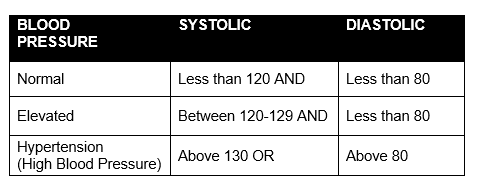High blood pressure, or hypertension, is a common health concern that affects nearly half of adults nationwide. It’s often referred to as the “silent killer” because it can go unnoticed for years while quietly damaging your arteries and increasing your risk of heart disease, stroke, and other serious health conditions. Fortunately, there are effective lifestyle strategies you can implement to help control your blood pressure and promote overall health. These measures include exercising regularly, avoiding tobacco and nicotine and using healthy eating strategies.
What do the Numbers Mean?
Blood pressure is a measure of the amount of force (pressure) generated by the heart when it contracts and during rest. Blood pressure measurements are recorded as two numbers, known as systolic and diastolic values respectively. Systolic pressure represents the pressure when the heart contracts, diastolic pressure represents the amount of force in between contractions.
Measurements below 120/80, which is read as “120 over 80”, are considered normal for an adult. Beginning in 2017, the requirements for a diagnosis of high blood pressure (hypertension) were changed. Currently, repeated measurement with either a systolic pressure above 130, or a diastolic pressure above 80, qualifies for the diagnosis. Refer to the chart below for further information.
Causes of High Blood Pressure
About 95% of the time, the exact cause of hypertension is unknown, because many factors can contribute to elevated blood pressure. Sometimes high blood pressure is related to a specific medical condition, such as Obstructive Sleep Apnea or chronic pain. Your doctor will help search for potentially treatable causes. Either way, lifestyle behaviors are things you can change over time to improve your blood pressure and help potential medication work better.
Embrace a Balanced Diet
The foundation of managing blood pressure lies in healthy daily food choices, regular exercise, and proper sleep and stress management.
A healthy diet can reduce your blood pressure as well as some medications, and with only positive side effects. Focus on a diet rich in fruits, vegetables, whole grains, lean proteins, and healthy fats. These foods provide essential nutrients and fiber that can help keep blood pressure healthy.
Foods high in sodium increase fluid retention and therefore, blood pressure. Aim to limit your daily sodium intake to around 2,300 milligrams (about one teaspoon of salt) or less. Processed foods, canned soups, and restaurant/fast-food meals are usually loaded with sodium, even if they don’t taste salty.
Try to make meals at home and flavor your dishes with herbs, spices, and other salt alternatives.
Potassium-rich foods like bananas, oranges, and spinach are beneficial as they counterbalance sodium’s effects on your body.
Both magnesium and calcium play essential roles in blood pressure regulation. Foods like almonds, spinach, and dark chocolate are excellent sources of magnesium, while dairy products and fortified plant-based milk alternatives are rich in calcium.
Limiting alcohol will also help blood pressure. It has been clearly established that alcohol does not provide health benefits or protection of any kind, so the less alcohol you use, the better.
For more information on nutritional strategies for blood pressure control, check out the DASH Eating Plan[1] (Dietary Approaches to Stop Hypertension), available online from the National Institutes of Health.
[1] https://www.nhlbi.nih.gov/education/dash-eating-plan
Continue Reading September 2023 Newsletter: Goodnight Sleep Tight with Good Sleep Hygiene


